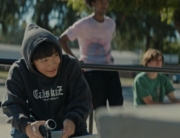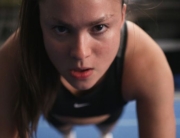Here in 2022, what do you think of when you hear the word Ukraine? War. Bombed out cities. Images of displaced people arriving, tired and bewildered, in foreign countries, wondering if they will ever see their homes again. But this is not the first year Ukraine has recently been thrown into war and chaos. Elie Grappe’s Olga is set during another moment of political upheaval.
In 2013, 15-year-old Olga (Anastasia Budyashkina), a competitive Ukrainian gymnast, prepares for the European championships—an important step on the way to her Olympic dreams. However, her journalist mother writes stories exposing the corruption of President Viktor Yanukovych’s government, and the physical attacks on her put Olga at risk too, so the young gymnast is shipped off to Switzerland where she can continue to train in safety.
The Swiss team’s gym is better equipped than the one in Kyiv, and Olga is clearly the best gymnast on her new team, yet she quickly finds herself at a crossroads. First, she learns that in order to enter the competition as a member of the Swiss team, she would have to give up her Ukrainian citizenship and become Swiss. Then, an uprising breaks out in Kyiv as Ukrainians gather in the city’s Maidan Square to protest the brutality of the Yanukovych regime. As she watches the scenes of violence unfold in her hometown, Olga is forced to consider what is more important to her: the potential gold medals she has trained so hard for or her identity as a Ukrainian.
The film is at its best when focusing on Olga’s struggle between the personal and political. In Switzerland, she feels her teammates’ resentment and suspicion of her as they wonder whose place she is going to take. Worse, she doesn’t speak French well enough to understand their jokes and make friends—Olga is acutely aware she does not fit in. And when the uprising begins back home, Olga suddenly finds she isn’t in sync with her former teammates in Kyiv anymore. As her best friend from home excitedly relates to her what it is like to be part of the crowd fighting in Maidan Square, Olga wonders if she should be there and if she is missing out on something.
Though Olga centers on a gymnast, it’s not really about gymnastics. It’s not one of those sports movies that lavishes a lot of time showing full routines or fetishizing the hardship and physical sacrifices that go into gymnastics. Still, the gymnasts are all played by actual athletes, which gives the gym sequences an unforced naturalness. As Olga, Budyashkina has the level of stoicism you would expect from someone who has spent her entire life falling and getting up again, but she also opens up just enough to let us see that she does, indeed, hurt.
Sometimes the dialogue in Olga comes across as a bit clunky and expository, but having watching a subtitled version, that might just be the nature of the translation beast. At times, there are big, confusing jumps in relationships. In one scene, Olga defies and pushes back angrily at her Swiss coach, but then in the next, they seem to be suddenly getting along and Olga is making a lot of progress. Overall, the other characters are not as fully developed as Olga.
Nevertheless, Olga succeeds, aided especially by Budyashkina’s performance and Grappe’s understanding of the intensity of Olga’s alienation. Few of us are elite athletes who face the kind of weighty decisions and feelings of displacement that Olga confronts, but most can relate to the painful feeling of being young and wondering where you belong.

















Leave A Comment